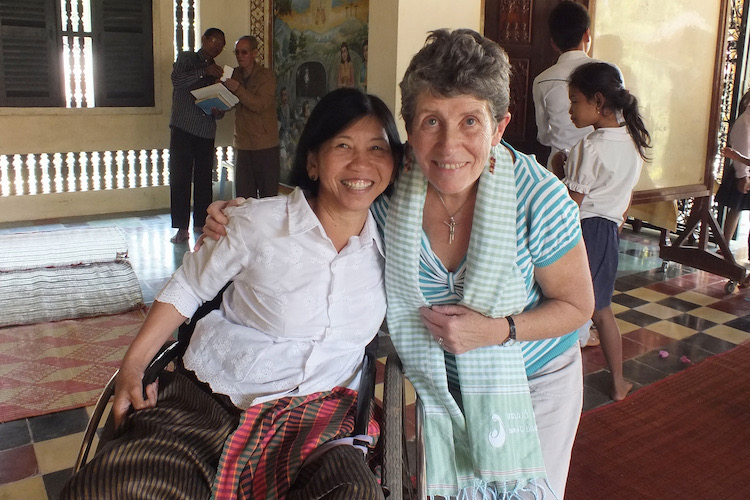
Key events in the Diocese of East Anglia for 2021
December 6, 2020
King’s Lynn lights up the church for Red Wednesday
December 7, 2020Marie-Madeleine Kenning, who has frequently visited Cambodia as part of the diocesan Building Bridges scheme, reflects on Pope Francis’ latest encyclical letter, Fratelli Tutti.
I did not expect when I embarked on reading Fratelli Tutti, that I would find in the very first paragraph a reference to Francis of Assisi so evocative of the Building Bridges scheme. A call for “a love that transcends the barriers of geography and distance and declares blessed all those who love their brother ‘as much when he is far away from him as when he is with him’”. It immediately brings to mind the fraternity and social friendship lying at the core of the scheme.
I tend to read encyclicals quite slowly, a few paragraphs at a time, reflecting on each one as I do. And, however inspired I feel I find myself, probably like many people, wondering: “Yes, but what then? How can I, an ordinary person, apply this to my everyday life?” Apart from signing petitions, joining a movement, sending money to a charity, or fundraising, none of which is necessarily easy to do.
This is what makes the Building Bridges so distinctive Bishop Michael Evans underscored this in his reply to the enquiry I had made on behalf of St Mary’s about the possibility of twinning with Cambodia. “I cannot stress too strongly,” he wrote, “that the prime object of twinning is not financial support. The most important thing is mutual friendship and solidarity” (February 2005).
I must confess that at the time this really puzzled me. How do you become friends with people living on the other side of the planet whom you have never met? Fifteen years and many visits later, I understand what Bishop Michael meant. But it has taken a while, as he had warned: “Any twinning will begin very slowly and tentatively…much like the development of any relationship.”
Visits to twin parishes counteract the indifference to the plight of others that the endless reports of famines, disasters and emergencies on our TV screens are apt to produce. “In today’s world,” writes Pope Francis, “the sense of belonging to a single human family is fading” (30).
I have found that cultural encounters which involve seeing at close hand people’s living conditions and listening to their life stories are a powerful antidote to indifference and inertia. They cannot fail to bring home the need for a more equitable distribution of the world’s resources and goods and for “a shared roadmap” (29-31) that our world currently lacks.
Take access to electricity, for example. Pope Francis mentions it in a paragraph on the importance of measuring poverty with criteria that correspond to present-day realities. There were no power lines in Chomnaom when we first went there in 2008. The villagers went about their lives much as they had done before, when lack of access to electricity was neither a sign of poverty nor a source of hardship.
This is no longer the case for the majority of the inhabitants, but they remember what it was like. Pope Francis writes: “Poverty must always be understood and gauged in the context of the actual opportunities available in each concrete historical period” (21). Anyone tempted to disagree with him should hear the villagers talk about the changes that electricity has brought to their life.
In line with my aim of trying to convey what visiting a twin parish is like, Then the Khmer Rouge Came (Kenning, 2020) offers several other examples of striking inequalities between life in the West and life in Cambodia. Thus houses in Chomnaom are still without running water while lack of adequate sanitation remains a major health hazard.
Certain passages from the encyclical jumped at me. One of these was the section on collective memory (246-9), which deals with the importance of remembering and acknowledging the atrocities perpetuated by various regimes, rather than dismissing them as belonging to the past.
Since 2015 I have talked regularly to survivors of the Khmer Rouge, and the Pope’s insistence reminded me of my interviewees’ desire to have their stories listened to. Did they hope their recollections would help inform and improve the future? I do not know, but sharing them validated what they had endured. And, in an ironic twist of fate, the memory of their courage and resilience would be an inspiration in the situation I found myself in shortly after my last visit in early 2020.
If I had to select a passage of Fratelli Tutti which I find especially challenging, I would currently choose two quotes from 119. They raise uncomfortable issues, only too easily swept under the carpet. The first, from Saint John Chrysostom, argues: “Not to share our wealth with the poor is to rob them and take away their livelihood. The riches that we possess are not our own but theirs as well.” Saint Gregory the Great’s succinct and direct way of presenting the same idea is even more disturbing: “When we provide the needy with their basic needs, we are giving them what belongs to them, not to us.” Do I, do we, truly believe this? And crucially, do we act on it?
Note: Then the Khmer Rouge Came: Survivors’ Stories from Northwest Cambodia, a memoir is available in print format (£14.99) from from www.troubador.co.uk and as an e-book (£9.99) from online retailers. All author profits from sales go to support those in need in Cambodia.
Pictured above is Marie-Madeleine with a Building Bridges friend




